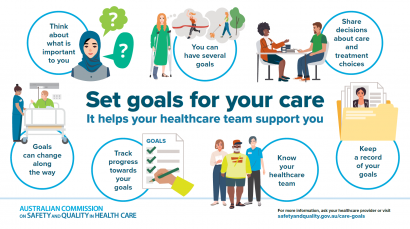We are committed to person-centred care - supporting patients, families and carers to be actively involved in decisions about their care. The Charter of Shared Decision Making has been developed by consumers and staff to show the key principles in support of this process.
Charter of Shared Decision Making
| Principles | Patient/Carer/Family (Consumer) Statement | Healthcare Worker Statement |
|---|---|---|
|
Mutual Respect |
As a patient/carer/family, when I speak about my needs, wants, thoughts and question information, I do so in a way that is respectful of my healthcare team. |
As a healthcare worker, when I interact with patients (carers/families), I acknowledge the person’s understanding and expertise in their own body, I do not make assumptions about the person but rather ask, and I endeavour to learn about the person I am caring for before, during and after delivering an episode of care. |
|
Sufficient Information |
As a patient/carer/family, if I do not understand something, I know that I can ask questions and for information to be given to me in a way that I can understand. |
As a healthcare worker, I strive to give patients (carers/families) unbiased information that is suitable for their specific level of understanding and in a way they are best able to process, and I take time to answer their questions. |
|
Communication |
As a patient/carer/family, when I speak with healthcare workers, I am open and honest and take time to explain my health questions and concerns knowing they will be welcomed, acknowledged, and understood. |
As a healthcare worker, when I talk with my patient (carer/family), I use simple clear language, active listening and try to understand the patient’s cues. I take time to get to know my patient and answer any questions they may have. I work towards shared decision making with my colleagues through improving interdisciplinary team communication to benefit the patient/consumer. |
|
Clarifying personal values and preference to create shared goals |
As a patient/carer/family, I can start the conversation with my healthcare team about my values, preferences, and expectations of care, so we can come to a goal of my choice that we work towards together. |
As a healthcare worker, I support my patient (carer/family), to discuss what matters to them, their preferences, and expectations for their healthcare, so together we can actively work towards their goals, in a person-centred way. |
|
Support |
As a patient/carer/family, I can always ask for support when I need to talk about an appointment, make a decision or need more information. There are support people I can call on such as family and friends, GP, treating doctor or other healthcare workers. |
As a healthcare worker, I strive to provide supported decision-making tools and encourage my patients (carer/family), to identify and link in with a support system outside of the hospital and/or within the hospital, so they feel equipped to make decisions and are supported to process medical information. |
Principles
Shared decision making is important. Healthcare can be improved when patients, families and carers (consumers) share – with their healthcare providers – what is important to them and any issues that may impact on their care and treatment plans. Together we can develop the right plan for your care.
Shared decision making involves discussion and collaboration between you as a consumer of health care and your healthcare provider (doctor, nurse, physio, pharmacist etc). It is about bringing together your values, goals and preferences with the best available evidence about benefits, risk and uncertainties of treatment, in order to reach the most appropriate agreed healthcare decisions for you.
Identifying goals of care – Tips for patients and consumers
Identifying your goals of care is a key part of ensuring you receive the best care for you. We need to know “What Matters to You?”
- Australian Charter of Healthcare Rights (second edition) – Right to Information; Understanding my Healthcare Rights (Consumer Edition)
What you need to know for yourself, your family or someone you care for
Finding good health information online
Consumer information on asking questions – writing things down, having a communication book, knowing asking questions is okay
- Communicating with your healthcare provider when you are in hospital – An information sheet for consumers
Supportive resources on shared decision making to help you and your healthcare professional share decisions together
- Choosing Wisely Australia: 5 Questions to Ask before getting any test, treatment or procedure
- Health Direct Question Builder
Sometimes things don’t go to plan in your health care, or in the care of a relative, friend, or someone you care for. This guide has been designed to help you if this happens.





